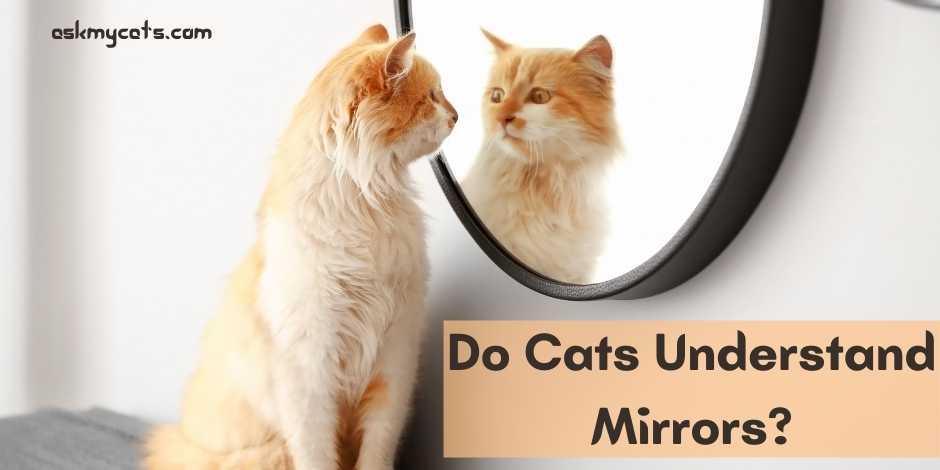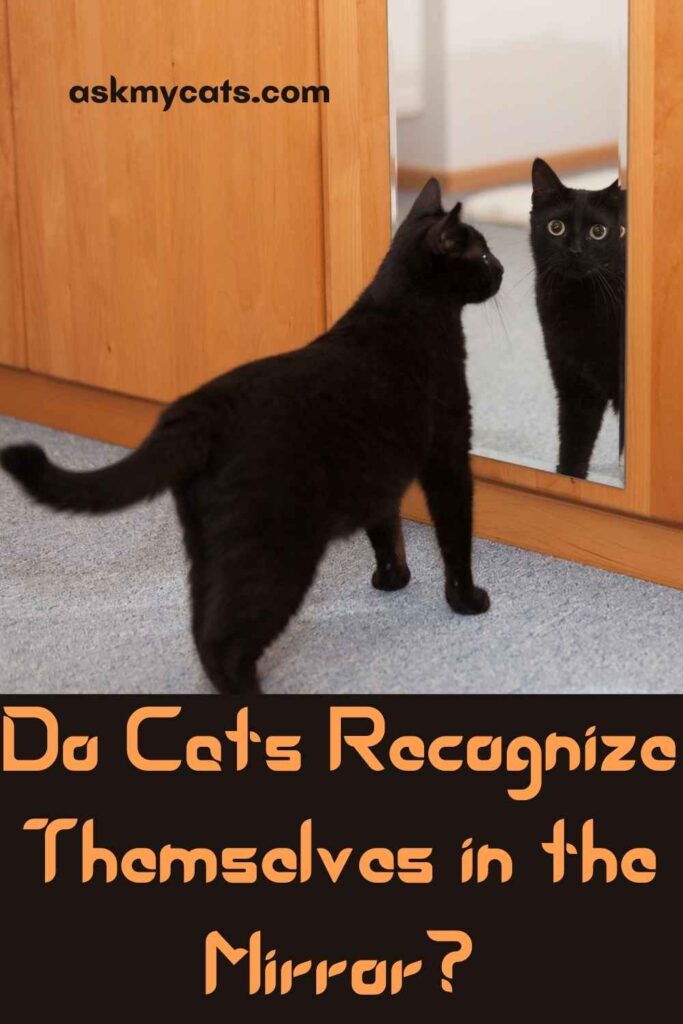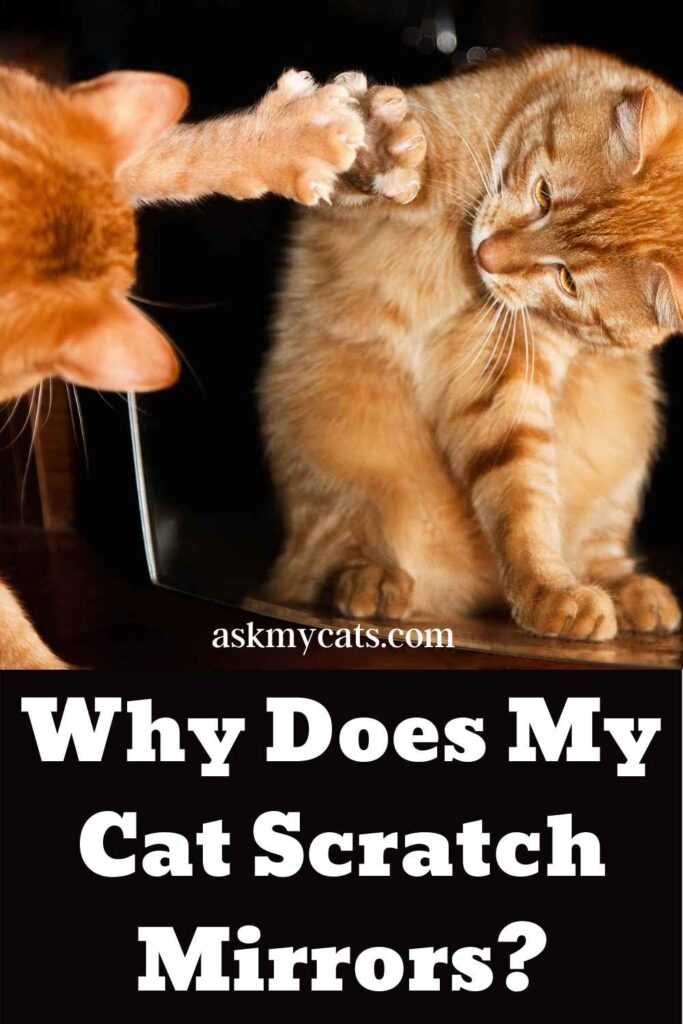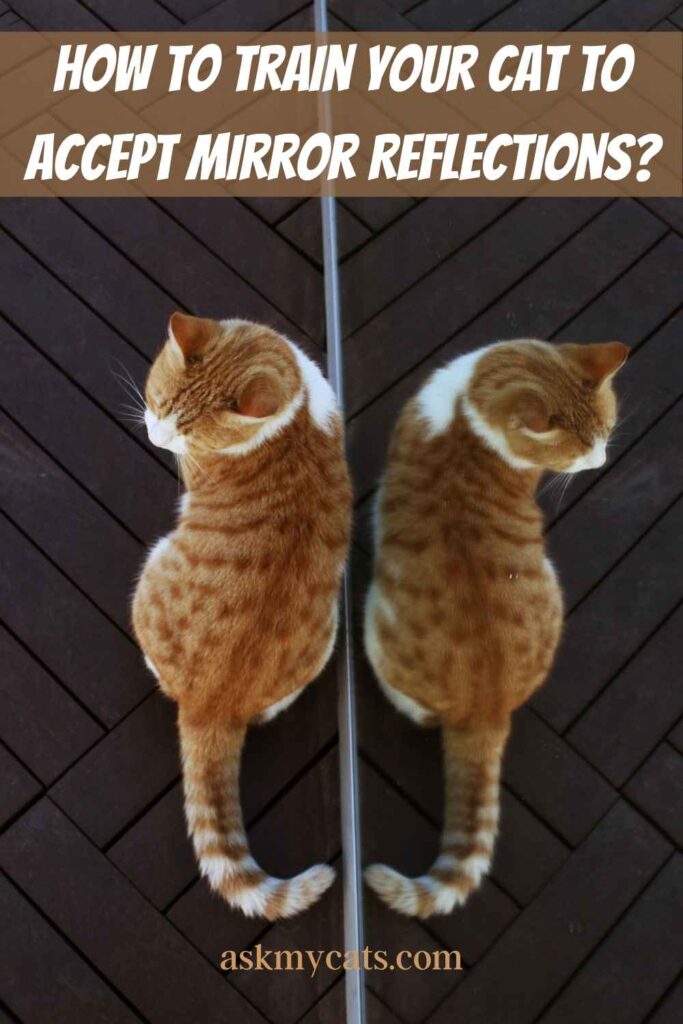In the 1970s, psychologist Gordon Gallup conducted the most famous investigation on the self-identification of animals using mirrors.
The researchers watched a number of animal species to discover who can gaze and identify themselves in a mirror if any.
To achieve this, the investigators put a red, unhappy point on the front of the animal and placed it in the mirror.
They saw indicators that the animal understood the change in appearance, indicating that it possessed a sense of self-conception.
Cats can see their own reflection, but seldom identify themselves in mirrors. Your cat believes that a new feline has access to his house, leading to fear or territorial aggressiveness.


Give Your Cat the Perfect Day
Get the Free Ebook!
Do Cats Recognize Themselves in the Mirror?
Most cats won’t recognize themselves in the mirror since they don’t truly see their faces. Cats rely on smell and sound more strongly.
That is why cats react more than their physical presence to the voice of the owner.

We must study the findings of the Mirror Test in order to understand if cats can identify themselves. This was an experiment with psychology carried out in 1970.
Chimpanzees have been exhibited in a mirror, as detailed in The Cognitive Animal. These chimpanzees were then examined for their responses. The goal was to see if the apes recognized themselves.
Mirrors and cats have a complicated connection. Some cats can spend hours staring at their reflections. Some people escape right away as if they’re afraid of their own reflection. Others will become enraged, clawing at mirrors.
If your cat is afraid of mirrors, try to limit his or her interaction with reflecting objects around the house.
This keeps your cat from harming itself while fleeing and reduces the chance of shattered glass if a standing mirror falls over.
Chimpanzees, like cats, behaved territorially and fiercely at first. The mirror test was marked as a failure in this case. A chimp has to demonstrate an awareness of reflected surfaces in order to pass.
This was accomplished by marking the ape’s body in some way. The chimp passed if this mark was identified in its reflection and looked for it on the body.
After a few days, the majority of the test subjects passed the mirror tests.
The mirror test was eventually expanded to include additional animals, including cats. To this day, the results are still inconclusive.
The biggest problem is that cats are fiercely independent. Cats are notoriously disobedient to human commands, especially during scientific tests.
You might, however, do your own mirror test. Simply apply a sticker on the paw or breast of a cat. It’s best to choose a blue or green sticker because cats prefer these colors.
Once the sticker is in place, position the cat in front of a mirror. You must observe the cat’s behavior once it sees the sticker in the mirror.
The cat may detect the foreign object and attempt to remove it with its paws or jaws.
The cat has passed the mirror test, based on this. Your cat will be less likely to respond to mirrors in the future if it achieves this achievement. It recognizes that it is looking at its own image rather than that of another cat.
Do Cats Like Mirrors?
Cats usually do not like mirrors because they act strangely around mirrors.
Many owners realize cats are oddly behaving around mirrors. Felines have a large range of reflecting surface responses.
These could include:
- Execute yourself
- She’s like being riveted into the mirror
- Claws unchecked on the mirror
- Meowing and verbalizing, frequently more intensely
- Full indifference
The main reason for these reactions is the same. The cat does not recognize himself but looks at his reflection.
Rather, the cat thought that there was another cat in the house. A response from fight or flight is then activated.
If so, the cat doesn’t like mirrors. It is fair to presume. Naturally, cats are territorial and unwilling to share.
Do Mirrors Scare Cats?
When your cat encounters a mirror, it’s quite likely that it will escape.
Everything relies on how your cat reacts to threats. You’ll have to control the problem if your cat’s scared of mirrors.
Regular outbursts of anxiety elevate the heart rate of a cat which is potentially deadly for some animals.
Begin by reducing the display of your cat. This does not mean that all reflecting surfaces be removed from the house. That is not an ambition that is practical or sustainable.
Concentrate instead on the following techniques:
- When you’re not at home or asleep, cover your mirrors.
- Furniture can be used to block a cat’s line of sight for full-length mirrors.
- Make sure your cat has a territory free of reflecting surfaces.
- Place calming smells and pheromones in the vicinity of mirrors.
Exposure treatment is another option. Play with your cat in front of the mirror and use catnip to get them to investigate. This teaches your cat that mirrors may be entertaining and pleasurable.
Why Does My Cat Scratch Mirrors?
Cats attack mirrors by scratching for one of two reasons: territorial marking or aggressiveness at perceived intruders.

The first option is the most common. In such a scene, some felines will quickly attack. This is a fear-driven reaction.
The cat is concerned that this newcomer may rob it of territory, food, or affection. As a result, it views assault to be the most effective kind of defense.
Scratching at mirrors by cats is a regular, though unwanted, occurrence. The cat is unlikely to break the mirror. The keratin contained in feline claws is often resistant to glass.
Regardless, if a freestanding mirror falls over, the cat risks injuring itself.
The cat will eventually grow out of this habit. It will sense its competitor’s absence of aroma and touch. However, this can take a long time, and harm can be done in the meanwhile. It’s best to keep an eye out for and avoid this behavior.
A cat may scratch a mirror even if it is not violently assaulting it. It’s just a case of the cat claiming the area as its own.
In their paws, cats have sweat glands. This aroma is released by rubbing paws on a surface, and it is highly retained by the glass.
Unfortunately, smudges on a mirror are likely to occur on a frequent basis. As a result, all traces of your cat’s aroma will be gone.
It could then scratch to leave a more lasting reminder of ownership. Claw markings are a clear statement that says, “This place is taken, move onward.”
The claws of a cat are seldom powerful enough to carve grooves in a mirror. Your mirror may be secure, but your cat’s claws might not be.
During the scratching procedure, the cat’s paws may be damaged. Calm the cat down by providing it with a new territory.
Why Is My Cat Meowing At Mirror?
A cat that meows at its own image is not speaking to itself. After kittenhood, cats don’t use meows to interact with one another. This sound has developed only for the purpose of attracting human attention.
You are being summoned by a cat that meows at a mirror. The cat is most likely informing you that there is another animal in the house.
The cat prefers that you deal with the intruder since it does not want to deal with it on its own.
Why Is My Cat Staring at the Mirror for Hours?
For several hours at a time, some cats will look intensely into a mirror because it assumes the reflection to be a different, invading beast.
Felines, after all, are quite particular about their look. However, narcissism is not present in this case.
The cat, on the other hand, has chosen not to escape or fight. Instead, it has become stuck to the ground out of dread. The cat is on the lookout for signs of hostility.
It’s likely that the cat is scared if it’s entirely still and frozen. When a car’s headlights approach, this is the equivalent of frozen to the spot.
If this is the case, gently divert your cat’s attention away from you.
Make a racket. It shouldn’t be overly loud or too abrupt. Make a noise that dispels the mirror’s enchantment.
The cat is probing for a reaction if it makes any movements, no matter how little. Body language is the primary means through which cats communicate.
The cat will be on the lookout to see whether this invader follows suit. This might be as modest as a flick of the tail or a paw raise.
Why Doesn’t My Cat React to Its Own Reflection?
Cat reacts to its own reflection because your cat is no longer afraid of reflecting surfaces. The cat will recognize the feline in the mirror as its own and go about its business.
Maybe your cat is at ease around other cats. This might be the case if your cat gets along with other pets in the area without issue. The cat appears unconcerned with the presence of another kitty in the house.
This is also made feasible by the mirror’s lack of fragrance. The scent is an important means of communication for cats. The cat is unconcerned since the mirror cannot emit any scents that indicate aggressiveness.
Check to see whether your cat’s vision is deteriorating. It may be losing sight if it stumbles into furniture or has trouble finding food or water.
Senior cats’ eyesight deteriorates with age, according to the Journal of the American Animal Hospital Association.
How to Train Your Cat to Accept Mirror Reflections?
Cats are aware of their beauty, yet their reactions to a cat image in a mirror are varied.
Some cats disregard the mirrored kitten entirely, while others are intrigued, maybe wondering why this other feline lacks a distinct scent.
Other cats, on the other hand, may become hostile or scared when they see their reflection.
If your cat is having a bad response, there are several things you may do to assist.

1. Understand the Possible Cause
Exploring the probable causes of a cat’s negative reaction to stimuli is frequently the key to helping them overcome it.
There are a variety of reasons why a cat could act out, hide from the “intruder,” or become really afraid when it comes to mirrors and reflections.
One of the most prevalent symptoms is that young cats that have never seen a mirror develop it.
Kittens that have spent their whole lives at an animal shelter are unlikely to have been exposed to ordinary home items such as mirrors, carpets, or televisions and radios.
Each of these elements might cause dread of the unknown when they are adopted and brought into a house.
2. Observe the Behavior
Reflections cause cats to behave in a variety of ways. It’s a good idea to keep an eye on your cat for a while to see whether it’s acting afraid or aggressive.
It’s only a period for many cats, a part of growing up and discovering their new environment.
Cats frequently try to locate the other cat by pawing underneath or to the side of the mirror in order to “get around” the barrier that prevents contact.
Many cats do the same thing when they see birds or other creatures on TV and mistake the screen for a window.
3. Cover Up Mirrors
Although many cats ultimately realize that the mirrored cat is not a threat, some do not. In an attempt to fend off this invader, they may go so far as to assault the mirror.
If the problem isn’t handled, the habit may worsen and turn into an obsession.
You may need to remove all reflecting surfaces that are at your cat’s level in these circumstances. At the very least, tape paper or place a cloth over mirrors to prevent your cat from seeing its reflection and practicing aggressive behavior.
4. Keep Real Intruders at Bay
If you notice that stray cats in the area are increasing your cat’s sensitivity to windows and mirrors, you should remove them.
Keep the drapes drawn so your cat can not see them while you use various methods to keep cats out of your yard.
Once your deterrents have worked, you may gradually return to normal, open the curtains and your cat may become more susceptible to reflections once more.
5. Reintroduce Mirrors
After some time has passed since you took these precautions, you may be able to gradually reintroduce your cat to mirrors.
Make sure the mirror is connected with pleasurable experiences like toys, rewards, or catnip when doing so.
Allow your cat to enjoy themselves in front of an uncovered mirror by luring them there with their favorite object.
They may be too preoccupied to see the reflection, or they may see that it is likewise quite joyful and poses no threat.
Frequently Asked Questions
Do cats react to mirrors?
When cats gaze in the mirror, they don’t recognize themselves. They mistakenly believe they are seeing another cat when they view their reflections. Because cats are territorial, they may puff themselves up in an attempt to defend their area from the newcomer.
Why are cats obsessed with mirrors?
A cat that is inherently fearful or aggressive may identify the glossy surface of a mirror with a bad event. Even if they had previously welcomed the invader, they may learn to link this hatred with their own reflection and become apprehensive of that visitor.
What does it mean when a cat mirrors you?
According to new research, cats reflect their owners’ personalities. These infamously independent creatures were shown to replicate their owners’ personalities, notably with features like extroversion, openness, and neuroticism or emotional stability, according to a new study published in the journal PLOS ONE.
Final Words
Most cats can put mirror-angst behind them with time and practice.
If your cat continues to be afraid of mirrors, you may want more assistance.
Comfort Zone with Feliway, for example, is a pheromone product that can help soothe unhappy feelings. To disperse the smell around the room, spritz it around the mirror or use a diffuser.
Shoot your queries in the comments section below!
